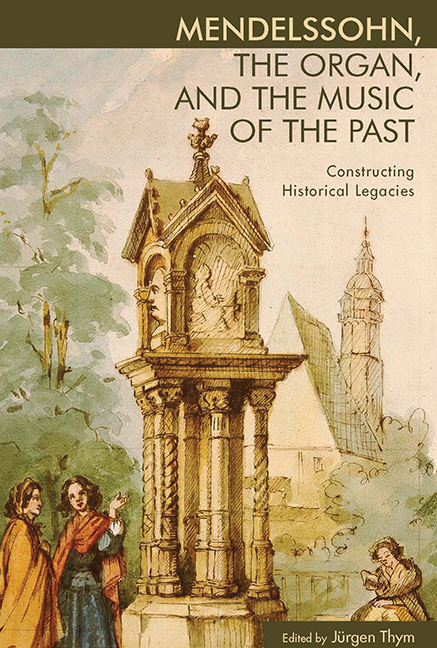Book contents
- Frontmatter
- Dedication
- Contents
- Acknowledgments
- Introduction: Of Statues and Monuments
- Part One Composition and Tradition
- Part Two Mendelssohn and the Organ
- 4 Mendelssohn and the Organ
- 5 Some Observations on Mendelssohn's Bach Recital
- 6 “He Ought to Have a Statue”: Mendelssohn, Gauntlett, and the English Organ Reform
- 7 Mendelssohn's Sonatas, Op. 65, and the Craighead-Saunders Organ at the Eastman School of Music: Aspects of Performance Practice and Context
- Part Three Mendelssohn's Inherited Legacies in Context
- List of Contributors
- Index
4 - Mendelssohn and the Organ
from Part Two - Mendelssohn and the Organ
Published online by Cambridge University Press: 14 March 2018
- Frontmatter
- Dedication
- Contents
- Acknowledgments
- Introduction: Of Statues and Monuments
- Part One Composition and Tradition
- Part Two Mendelssohn and the Organ
- 4 Mendelssohn and the Organ
- 5 Some Observations on Mendelssohn's Bach Recital
- 6 “He Ought to Have a Statue”: Mendelssohn, Gauntlett, and the English Organ Reform
- 7 Mendelssohn's Sonatas, Op. 65, and the Craighead-Saunders Organ at the Eastman School of Music: Aspects of Performance Practice and Context
- Part Three Mendelssohn's Inherited Legacies in Context
- List of Contributors
- Index
Summary
Felix Mendelssohn's first personal encounter with the organ, for which we have any evidence, occurred in the summer of 1820, when he was eleven years old. While on vacation with his family along the Rhine, Felix played the tiny organ in the St. Rochuskapelle, a pilgrimage church, high on a hill just outside the town of Bingen. Seventeen years later, in 1837, while on his honeymoon, Felix again climbed the same hill, this time with his bride, Cécile. Unfortunately, the chapel was closed. As Cécile noted in their diary, Mendelssohn was deeply disappointed, since he “would have liked to have seen once again the little organ upon which as a child he had played for the first time in his life.”
Certainly, Mendelssohn must have heard numerous organs in various Berlin churches during his childhood years, but in the Rochuskapelle he had played the instrument for the first time, and the experience left an indelible impression on him. Only a few months afterward, in the fall of 1820, Mendelssohn began his study of the organ with the Berlin organist, August Wilhelm Bach, and on November 28 of the same year he essayed his first composition for organ, a lengthy Praeludium in D Minor (MWV W2). Although impossible to confirm, it seems reasonable to infer that these events of 1820 were closely interrelated, particularly in view of the fact that two years would elapse before Mendelssohn again composed for the organ. Clearly, by the end of 1820 Mendelssohn's predilection for the organ had been firmly established and would continue to make itself felt throughout his life.
Although Mendelssohn evinced a natural inclination for the organ, he never entertained any thought of becoming a professional organist. In the first place, he was financially independent and did not need the meager salary that most organists were paid. Moreover, he was born into a social class to which few organists had ever belonged, and he moved in social circles from which most organists had always been excluded. Far more important, however, is the fact that from early on Mendelssohn's primary professional locus was not the organ loft but the concert hall; by his early twenties he had already built an enviable international reputation as a composer, conductor, and brilliant keyboard performer.
- Type
- Chapter
- Information
- Mendelssohn, the Organ, and the Music of the PastConstructing Historical Legacies, pp. 91 - 110Publisher: Boydell & BrewerPrint publication year: 2014

